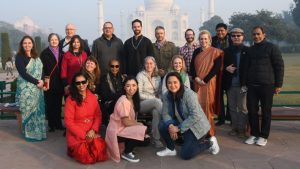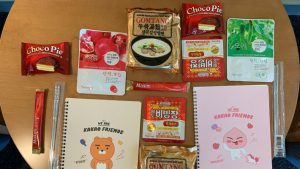In just two short years, Global Leadership and Service Projects (GLSPs) have established themselves as a potent activity for shaping global business leaders who understand their obligations to the less fortunate in the world. Not only have the three projects drawn ninety students from the university as organizers and participants, but also, students from other universities have received scholarships to join in and have spread the idea to their own schools—here and abroad.

A core activity of the International Business Honor Society (IBHS), with support from the College of Business Administration and the Center for Business Education and Research (CIBER), among others, GLSPs are “a community service vehicle that we describe as a ‘dual side experience without frontiers,’” said Robert Hogner, associate professor, Department of Management and International Business, and coordinator of the college’s Civic Engagement Initiative.
Two GLSPs have gone to Bangkok, and one to Nicaragua. Plans are underway for the third working trip to Bangkok in the spring of 2007 and for the second “December of Dreams to Help Kids,” to Nicaragua this year.
Students see the world—and its needs—and apply their business background.
“We created the GLSPs as part of an effort to find a niche project to separate our International Business Honor Society (IBHS) from other student organizations and to give our members an unprecedented, experiential learning opportunity through which they could apply what they’ve learned in their courses,” said Mark Elbadramany, a co-founder of IBHS, who will graduate in December, 2006, with a double major in International Business Honors (IB Honors) and finance. He also serves as executive director of the newly-founded international organization, IBHS, Inc., which will charter chapters worldwide, and participated in both GLSPs to Bangkok.
“It’s one thing to study the macro-economic structure of Thailand and learn about the currency crisis and the country’s resulting debt,” he said. “It’s another thing to see the impact of the poverty in the faces of the children.”
As business students, the organizers understood from the start that they needed a coherent and repeatable plan—one they’ve refined since they first implemented their ideas in Bangkok in 2005.
“We have standardized logistics to do these projects, including fundraising, financing, marketing, organizational structuring and charts, training manuals, and cultural background materials,” Elbadramany said. “Our goal is for students everywhere who go through these resources or participate in a GLSP to be able to launch their own initiatives in other areas of the world—further cultivating them as leaders for tomorrow.”
Another change: IBHS’s vice president is charged with overseeing both GLSPs. For the current vice president, Douglas Garcia, an international business and finance major who expects to graduate in the spring, 2007, that means an almost-full-time commitment.

“I am the person in charge of making the GLSPs a reality by making sure we do logistics, pubic relations, and organizational management, and I work with the IBHS board, university faculty, fellow students, and the community,” he said. “For me, the GLSPs represent the opportunity to experience third-world community service and enable me to gain leadership, managerial, and service skills in preparation for being a member of the international business community.”
Both Garcia and Milvia Suarez, current president of IBHS, are veterans of the GLSP Bangkok–2006, which included three sites: the Association for the Promotion of the Status of Women site (APSW); the Children’s Creativity Foundation (CCF), a community school; and a summer day camp at the Klong Toey Community School.
“It was priceless to be able to take supplies to CCF and to give the orphans there a level of contact that’s missing in their daily lives,” Suarez said. “We got to see something out of the everyday, which reminded us of how much we take for granted. Working on projects—including fundraising, securing sponsorships, and bringing students in from other universities—also is a way to implant in others the idea and its importance.”
Planners affected by recent events in Thailand.
These global citizens who “do not want to be isolated and want to give back to the world,” according to Elbadramany, are getting a lesson on the impact of distant occurrences on their lives.
“The recent military coup in Thailand was seen by students not only as a global political event halfway around the world but also as a personal event involving the lives of people they know,” Hogner said. “Our students understand the political and social crisis that precipitated the coup; they understand by knowing much about the Thai people and how such a soft revolution could occur, and they understand how people’s lives will be changed as a new democratic constitution is established.”
IBHS seeks sponsors for upcoming GLSPs.
“We prefer monetary donations,” Elbadramany said. “For example, we will be distributing school supplies to nearly 3,000 children in Nicaragua, but it makes more sense for us to buy the items there, saving transportation costs and infusing some money into the Nicaraguan economy. Having the funds, rather than supplies, will help us the most.”




